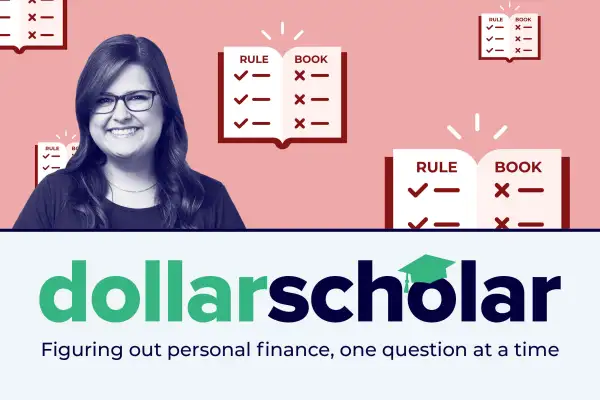Dollar Scholar Asks: Which Money 'Rules' Can I Safely Ignore?

This is an excerpt from Dollar Scholar, the Money newsletter where news editor Julia Glum teaches you the modern money lessons you NEED to know. Don't miss the next issue! Sign up at money.com/subscribe and join our community of 160,000+ Scholars.
From “Dump him!” to “Delete that comma,” I love to give advice to people. I’m always happy to share an opinion (or two, or three). I dole out recommendations, Yoda-style, like I’m wise and mature and have my life figured out.
When someone gives me advice, though, I admit I don’t always follow it. Especially when it comes to personal finance — a topic that's rife with conflicting opinions and unrealistic milestones.
Let's face it: Most money advice is just oft-repeated adages about how much you should spend and save. But due to the nature of personal finance, these beliefs don’t necessarily apply to everyone. For instance, if I'd taken the "only spend 30% of your gross income on rent" rule to heart when I moved to New York City making $30K, I wouldn't have been able to afford to live, uh, anywhere.
In that spirit, I emailed a bunch of sources and asked for their least favorite financial tip (aka what popular “rule” they disavow or personally don’t follow).
Here’s what they said.
Only pay cash, and don’t use credit cards.
Who hates/breaks it: Jessica Goedtel, a certified financial planner in Allentown, Pa.
Why: “Paying cash means you’re missing out on potentially hundreds of dollars in credit card rewards. Credit cards also provide added fraud protection over cash and debit cards,” she writes. “Only pay cash if you really can’t trust yourself to pay off your credit card in full each month.”
You absolutely must stick to a budget.
Who hates/breaks it: Brad Wright, a CFP in Andover, Mass.
Why: “Eyes gloss over and ears begin to tune out. A budget dictates that you ultimately give something up,” he says. “Instead, creating a cash flow analysis — what comes in versus what goes out — gives you the power to decide if something is worth carrying on.”
Never get emotional when investing.
Who hates/breaks it: Dennis R. Nolte, a CFP in Winter Park, Fla.
Why: “I trade individual stocks to my detriment in my personal accounts. There. I said it. I get emotional. I make emotional mistakes. I advise others to have a pro help them take the emotion out of investing, yet I have difficulty doing it when it comes to my own money," he says. "It'd be most efficient if I stopped buying some individual stocks for personal trades and set it all aside in our asset allocation models.”
Your stock allocation, or the percentage of your portfolio that's invested in stocks, should be equal to 100 minus your age.
Who hates/breaks it: George Gagliardi, a CFP in Lexington, Mass.
Why: “Having only a 40% equity allocation when you are age 60, or 30% when 70, means that you are restricting the potential growth of your portfolio that you may need to depend on should you live well into your 90s,” he says. “Also, these days, bonds have changed from ‘riskless return’ to ‘returnless risk,’ particularly for bond index funds.”
If you rent, you're just throwing away money.
Who hates/breaks it: Gretchen Behnke, a CFP in Plano, Texas
Why: “The decision to rent vs. buy is a legitimate financial decision. There are pros and cons to both,” she says. “Yes, home ownership may help you build equity, but there are also many unexpected costs that get glossed over. Part of comprehensive financial planning is to help clients make the right decision for their unique situation.”
There’s a magic number (like $1 million) that you need to have saved before you retire.
Who hates/breaks it: Clark D. Randall, a CFP in Dallas
Why: “Financial planning, and specifically retirement planning, is so specific to the retiree that no number can be universal,” he says. “BTW, for the same reason, the rule of thumb regarding how much life insurance one should have utilizes exactly the same faulty logic.”
Always pay down your debt with the highest interest rate first.
Who hates/breaks it: Michelle Petrowski, a CFP in Phoenix, Ariz.
Why: “Sure, paying less interest appears the better ‘logical’ choice, but many clients need an emotional win,” she says. “For some clients, I recommend the ‘snowball method,’ where clients knock out those smaller debts first as a motivator to keep them chipping away at their balances, and research backs this theory up.”
Save 10% of your pay for retirement.
Who hates/breaks it: Nicole Sullivan, a CFP in Libertyville, Ill.
Why: “It is tremendous to save for retirement, especially early in your career. However, 10% may not be enough, depending on factors like your age, current nest egg, retirement income sources and lifestyle needs,” she says. “It's a good idea to consult with a financial advisor who can assess your big picture and provide guidance.”
The bottom line
I shouldn’t just blindly follow money rules because they’re popular. Heather Winston, the director of advice and financial planning at Principal, says that I should always consider whether a tip that works for someone else is right for me — and whether I can actually commit to it.
“Does it feel logical [and] realistic for your life, and can you genuinely see yourself following through, in good times and bad?” Winston asks. “It’s OK if it is, and it’s also OK if it is not.”
More from Money:
How to Choose a Financial Advisor in 6 Easy Steps
Here's Why Financial Advisors Won't Recommend Cryptocurrencies — Even if They'd Like to
